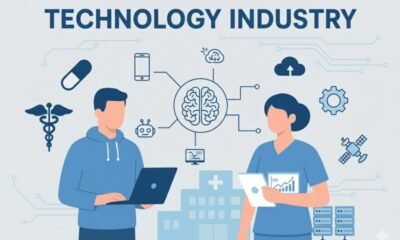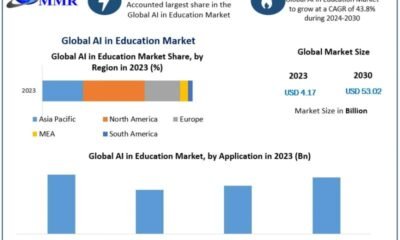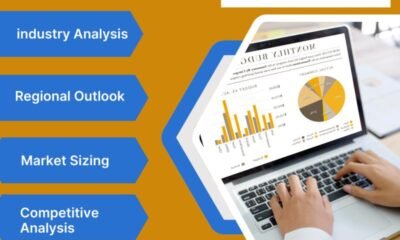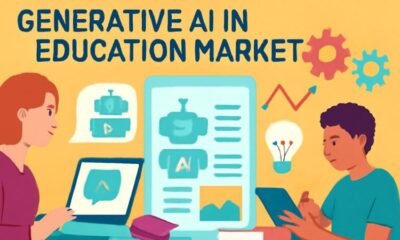Edge Artificial Intelligence (AI) Processor Market
The Edge AI Processor Market is undergoing a transformative shift as smart technologies continue to proliferate across industries. In 2025, the market size stood at US$ 3,677.1 million, and it is projected to surpass US$ 8,597.3 million by 2032, growing at a CAGR of 12.9% during the forecast period (2025-2032). According to Persistence Market Research (PMR), the market is driven by the need for real-time data processing in edge devices and the growing demand for enhanced data privacy, lower latency, and reduced reliance on cloud infrastructure.
Among the segments, consumer devices lead the market due to widespread adoption of smartphones and IoT gadgets. North America is the leading geographical region, expected to reach US$ 3.9 billion by 2032. This dominance is primarily due to a surge in the number of IoT-connected devices and heavy investment in AI infrastructure, particularly in the United States. Edge AI’s promise of real-time analytics without needing cloud connectivity is pushing its use across homes, vehicles, factories, and healthcare systems.
✅Get a Sample Copy of Research Report (Use Corporate Mail id for Quick Response): https://www.persistencemarketresearch.com/samples/33385
✅Key Highlights from the Report:
➤ The market is set to grow from US$ 3,677.1 million in 2025 to US$ 8,597.3 million by 2032.
➤ Consumer devices are expected to dominate with a CAGR of 12.4% during the forecast period.
➤ North America is forecasted to be the largest regional market by 2032.
➤ The CPU-based Edge AI processor segment is projected to maintain the highest traction.
➤ Real-time data processing and reduced latency are major adoption drivers.
➤ Automotive and healthcare sectors are emerging as high-growth end-use industries.
Market Segmentation: Breaking Down the Edge AI Processor Ecosystem
Edge AI processor market segmentation helps identify core growth pockets across various categories. By processor type, the market includes Central Processing Units (CPUs), Graphics Processing Units (GPUs), and Application-Specific Integrated Circuits (ASICs). Among these, CPUs remain the most sought-after segment due to their versatility and compatibility with a wide range of applications. As CPUs are cost-effective and energy-efficient, they are widely preferred for mobile and IoT applications, a trend emphasized by Persistence Market Research.
From a device type perspective, consumer devices dominate the market. The sheer volume of smartphones-projected to surpass 1.5 billion units by 2028-demonstrates how deeply integrated Edge AI processors are becoming in daily life. These processors power voice assistants, facial recognition, and personalization features directly on devices, thereby enhancing user experience while maintaining data privacy by reducing dependence on cloud services.
✅Regional Insights
The United States remains at the forefront of the edge AI processor revolution. With an expected CAGR of 11.4% from 2025 to 2032 and projected market size of US$ 3.1 billion, the U.S. growth is attributed to increased smartphone penetration and investment in AI-based innovations. Edge AI processors are being integrated into smart home systems, healthcare diagnostics, and autonomous driving technologies.
In the United Kingdom, the market is projected to reach US$ 478.0 million by 2032, driven by high smartphone adoption and advancements in 5G technology. Meanwhile, China is positioning itself as a global manufacturing hub for edge AI processors. The market in China is forecasted to be worth US$ 813.3 million by 2032, supported by the country’s massive production of smartphones and smart vehicles, and robust government initiatives to lead AI innovation.
✅Market Drivers
One of the primary drivers for the edge AI processor market is the exponential growth in IoT-connected devices. Expected to reach 75 billion devices by 2025, IoT is transforming industries like healthcare, automotive, and smart homes, all of which require instant data processing. Edge AI enables this by processing information directly on the device, reducing latency and increasing efficiency.
Another strong market driver is the rise of Industry 4.0. From predictive maintenance in factories to automated systems in logistics and retail, edge AI processors are becoming indispensable. The growing demand for real-time decision-making, coupled with stricter data privacy regulations, has made edge processing a practical and secure solution for businesses.
Finally, the integration of Edge AI in autonomous vehicles represents a transformative force. Autonomous driving requires millisecond-level decisions which are not feasible with cloud latency. Edge AI processors allow vehicles to make fast, independent judgments, enhancing safety and performance.
✅Market Restraints
Despite its strong growth trajectory, the market faces several restraints. One key challenge is the complexity of designing efficient edge AI chips that balance power consumption with computational speed. These chips need to function efficiently without access to the massive resources of cloud servers.
High upfront development costs and limited compatibility across diverse hardware ecosystems can also slow down adoption. Companies must invest in specialized talent and equipment to build edge AI systems, creating entry barriers for smaller players.
Furthermore, security concerns still exist. While edge AI offers better privacy than cloud-based models, securing data locally on devices from tampering or unauthorized access is a continuing challenge for manufacturers and users alike.
✅Request for Customization of the Research Report: https://www.persistencemarketresearch.com/request-customization/33385
✅Market Opportunities
Emerging opportunities for the edge AI processor market are numerous and far-reaching. The rapid expansion of smart cities is a fertile ground for innovation. Smart traffic systems, public safety networks, and energy management infrastructure require real-time data analytics, an area where edge AI excels.
Healthcare is another domain poised for disruption. From wearables that monitor vitals to diagnostic devices using AI for disease detection, edge processors can provide faster and more secure healthcare solutions. The market is set to grow as demand for remote patient monitoring and telemedicine increases globally.
Additionally, edge AI’s role in retail and e-commerce is expanding. Applications like cashier-less stores, smart shelves, and customer behavior tracking rely on localized decision-making. This opens doors for edge AI processor manufacturers to collaborate with global retail giants for next-gen retail solutions.
✅Reasons to Buy the Report:
✔ Gain in-depth insight into the global edge AI processor market dynamics and future trends.
✔ Evaluate market segments and opportunities across processor types and end-user industries.
✔ Understand regional dynamics and identify the most promising geographies for investment.
✔ Leverage competitor analysis and recent developments for strategic decision-making.
✔ Access actionable insights backed by industry-leading research from Persistence Market Research.
Company Insights
✦ Qualcomm Technologies Inc.
✦ Mythic
✦ Arm Limited
✦ HiSilicon Technologies Co Ltd
✦ Intel Corporation
✦ Advanced Micro Devices, Inc. (AMD)
✦ Rohm Semiconductors
✦ Hyundai Motor Group
✦ Alphabet Inc.
✦ Apple Inc.
✦ Samsung Electronics Co., Ltd.
✦ Nvidia Corporation
Recent Developments:
✦ In November 2022, Rohm Semiconductors unveiled an AI chip for edge computing with ultra-low power, capable of real-time failure detection in IoT devices.
✦ In January 2020, Apple Inc. acquired Xnor.ai, enabling AI functionalities to operate directly on devices like smartphones and cameras, reinforcing its edge computing capabilities.
Conclusion
The Edge AI Processor Market is poised to redefine the future of AI-powered applications by bringing computation closer to the data source. As industries transition towards smarter and more autonomous systems, the need for low-latency, energy-efficient, and secure processing becomes critical. With robust growth predicted across regions and segments, particularly in consumer devices and automotive applications, stakeholders across the ecosystem-from chip manufacturers to application developers-stand to benefit immensely.
Persistence Market Research reinforces the forecast with evidence-based insights, painting a future where Edge AI processors are central to innovation. From transforming urban infrastructure to enabling intelligent healthcare and personalized retail experiences, the potential of this market is vast and multifaceted. As companies navigate the technological, financial, and strategic landscapes, those who invest early and innovate consistently will lead the charge in shaping the intelligent edge.
Contact Us:
Persistence Market Research
G04 Golden Mile House, Clayponds Lane
Brentford, London, TW8 0GU UK
USA Phone: +1 646-878-6329
UK Phone: +44 203-837-5656
Email: sales@persistencemarketresearch.com
Web: https://www.persistencemarketresearch.com
About Persistence Market Research:
At Persistence Market Research, we specialize in creating research studies that serve as strategic tools for driving business growth. Established as a proprietary firm in 2012, we have evolved into a registered company in England and Wales in 2023 under the name Persistence Research & Consultancy Services Ltd. With a solid foundation, we have completed over 3600 custom and syndicate market research projects, and delivered more than 2700 projects for other leading market research companies’ clients.
Our approach combines traditional market research methods with modern tools to offer comprehensive research solutions. With a decade of experience, we pride ourselves on deriving actionable insights from data to help businesses stay ahead of the competition. Our client base spans multinational corporations, leading consulting firms, investment funds, and government departments. A significant portion of our sales comes from repeat clients, a testament to the value and trust we’ve built over the years.
This release was published on openPR.





































